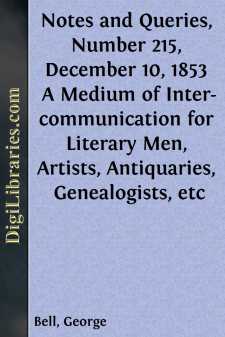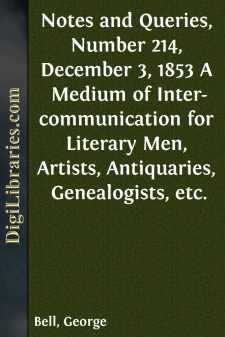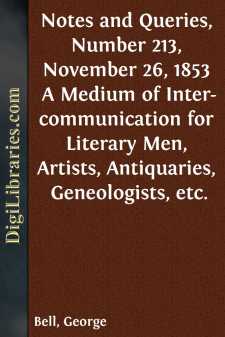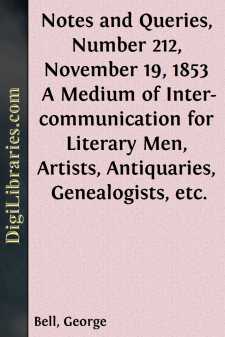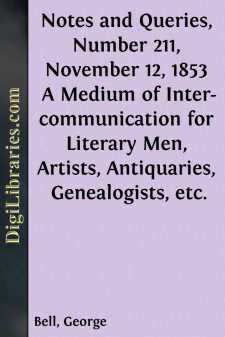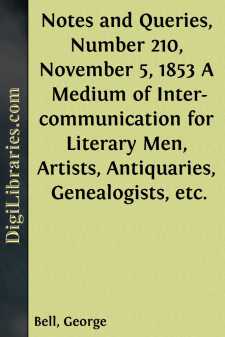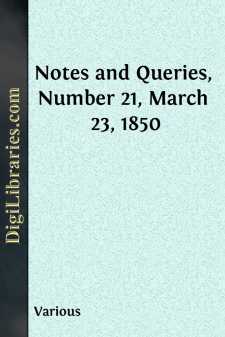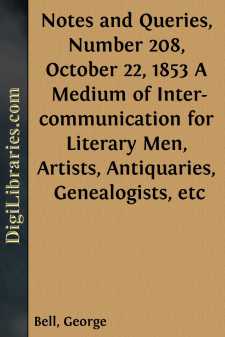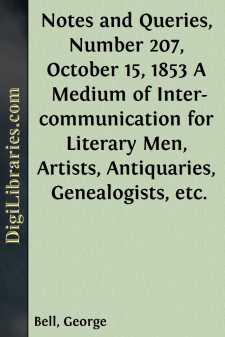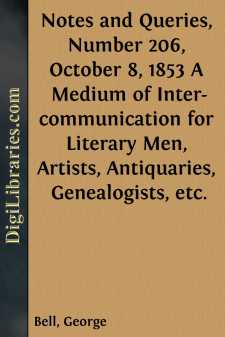Periodicals
- Art 27
- Children's periodicals 59
- Entertainment 5
- Food/Wine 2
- Games/Humor 455
- General
- Health 1
- History 53
- House/Home 1
- Regional 62
- Science/Nature 118
- Transportation 10
General Books
Sort by:
by:
George Bell
In my first communication I did myself the pleasure to send you a correct list of all the royal letters which had been sent by different English monarchs to the Grand Masters of Malta, with their dates, the languages in which they were written, and stating to whom they were addressed. I now purpose to forward with your permission from time to time, literal translations of these letters, which Mr....
more...
by:
George Bell
PETER BRETT. Your correspondent T. K. seems to think that Scotchmen, and Scotch subjects, have an undue prominence in "N. & Q.:" let me therefore introduce to your readers a neglected Irishman, in the person of Peter Brett, the "parish clerk and schoolmaster of Castle-Knock." This worthy seems to have been a great author, and the literary oracle of the district over which he...
more...
by:
George Bell
THE STATE PRISON IN THE TOWER. A paragraph has lately gone the round of the newspapers, in which, after mentioning the alterations recently made in the Beauchamp Tower and the opening of its "written walls" to public inspection, it is stated that this Tower was formerly the place of confinement for state prisoners, and that "Sir William Wallace and Queen Anne Boleyn" were amongst its...
more...
by:
George Bell
PARTY-SIMILES OF THE SEVENTEENTH CENTURY—NO. I. "FOXES AND FIREBRANDS." NO. II. "THE TROJAN HORSE." With Englishmen, at least, the seventeenth was a century pre-eminent for quaint conceits and fantastic similes: the literature of that period, whether devotional, poetical, or polemical, was alike infected with the universal mania for strained metaphors, and men vied with each other in...
more...
by:
George Bell
NOTES ON GRAMMONT. Agreeing with Mr. Peter Cunningham (vide History of Nell Gwyn), that a new edition of Grammont is much wanted, I beg to avail myself of your pages, and to offer a few remarks and notes which I have made in reference to that very entertaining work for the consideration of a future annotator. Of the several maids of honour mentioned therein I will begin with those of the queen. They...
more...
by:
George Bell
LORD HALIFAX AND MRS. CATHERINE BARTON. Those who have written on the life of Newton have touched with the utmost reserve upon the connexion which existed between his half-niece Catherine Barton, and his friend Charles Montague, who died Earl of Halifax. They seem as if they were afraid that, by going fairly into the matter, they should find something they would rather not tell. The consequence is,...
more...
by:
Various
EARLY STATISTICS.—CHART, KENT. Perhaps some one of your numerous readers will be good enough to inform me whether any general statistical returns, compiled from our early parish registers, have ever been published. An examination of the register of Chart next Sutton Valence, in Kent, which disclosed some very curious facts, has led me to make this inquiry. They seem to point to the inevitable...
more...
by:
George Bell
A PROPHET. What a curious book would be "Our Prophets and Enthusiasts!" The literary and biographical records of the vaticinators, and the heated spirits who, after working upon the fears of the timid, and exciting the imaginations of the weak, have flitted into oblivion! As a specimen of the odd characters such a work would embrace, allow me to introduce to your readers Thomas Newans, a...
more...
by:
George Bell
Notes on Midland County Minstrelsy. It has often occurred to me that the old country folk-songs are as worthy of a niche in your mausoleum as the more prosy lore to which you allot a separate division. Why does not some one write a Minstrelsy of the Midland Counties? There is ample material to work upon, and not yet spoiled by dry-as-dust-ism. It would be vain, perhaps, to emulate the achievements of...
more...
by:
George Bell
NOTES ON NEWSPAPERS: "THE TIMES," DAILY PRESS, ETC. A newspaper, rightly conducted, is a potent power in promoting the well-being of universal man. It is also a highly moral power—for it quickens mind everywhere, and puts in force those principles which tend to lessen human woe, and to exalt and dignify our common humanity. The daily press, for the most part, aims to correct error—whether...
more...


